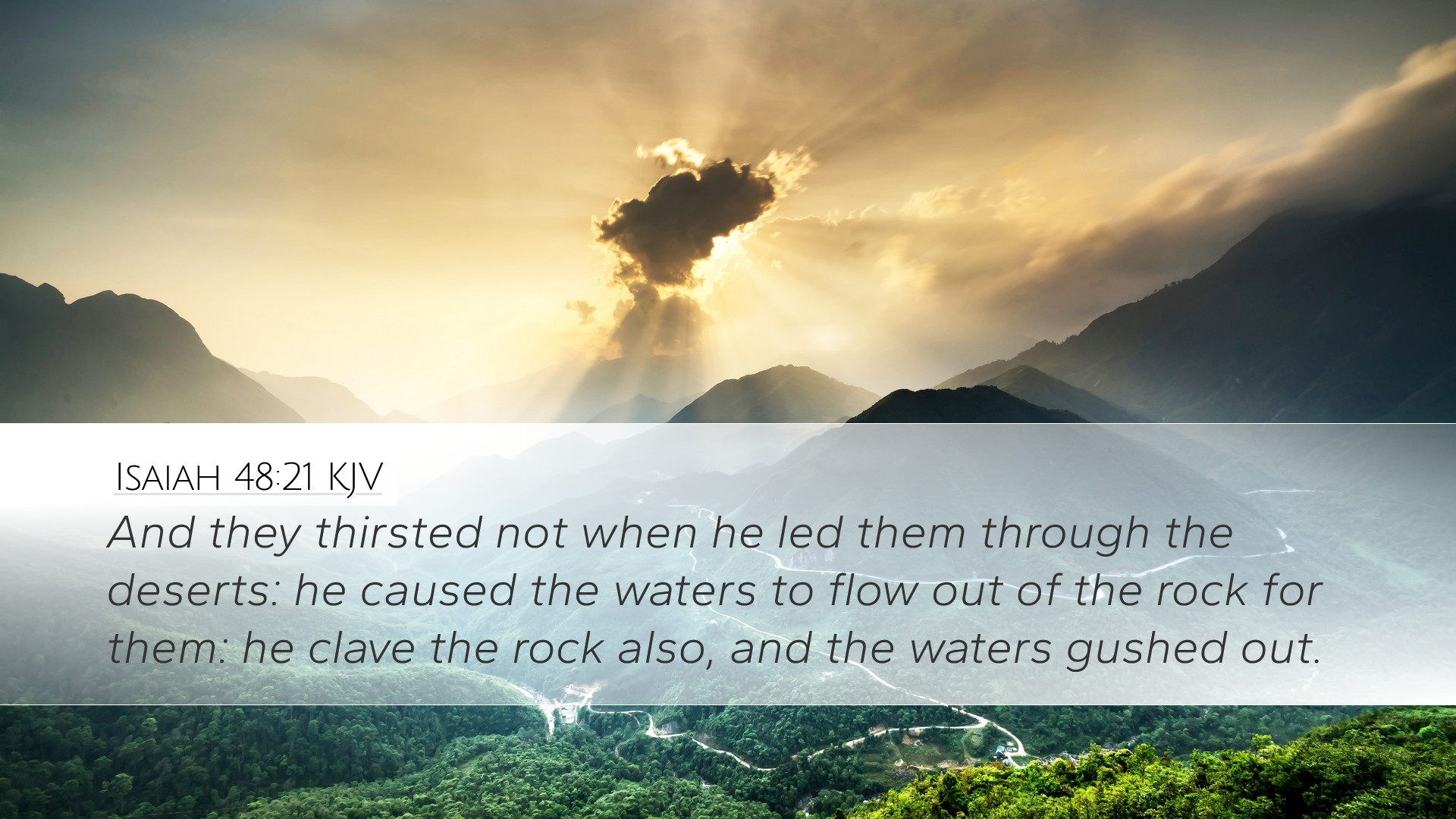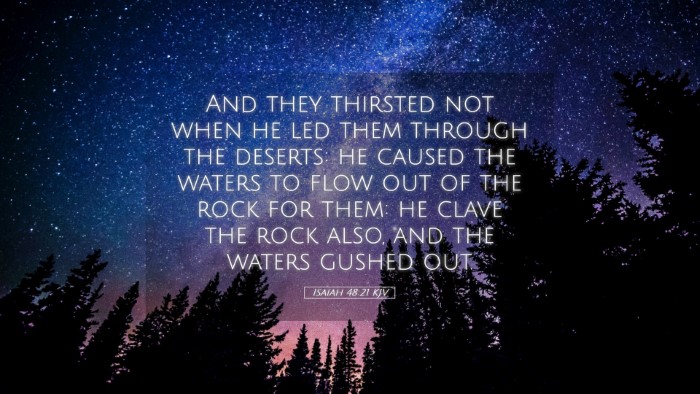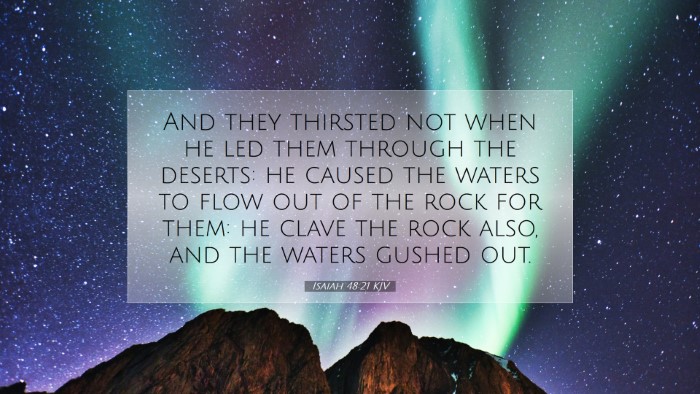Commentary on Isaiah 48:21
Verse Text: "And they thirsted not when he led them through the deserts: he caused the waters to flow out of the rock for them: he clave the rock also, and the waters gushed out." (Isaiah 48:21, KJV)
Overview
This verse is a profound reminder of God's providence and care for His people, particularly during their time of need. It captures the essence of divine guidance and the miraculous provision that God offers to His followers, especially when they are in barren and desolate circumstances. In this commentary, we will glean insights from notable public domain commentaries, providing a rich exploration for pastors, theologians, students, and scholars alike.
Contextual Background
Isaiah 48 forms part of a larger discourse where God is affirming His sovereignty and the faithlessness of Israel. The historical context includes the Israelites' Babylonian captivity, a time characterized by confusion and a spiritual drought, which parallels the metaphorical desert presented in this verse.
Insights from Matthew Henry
Matthew Henry highlights that this verse depicts a remarkable episode in the history of the Israelites when they were led out of Egypt. He emphasizes the miraculous nature of the events narrated, about how God quenched the thirst of His people in an inhospitable environment:
- Miraculous Provision: Henry notes that God, in His infinite mercy, provided water from the rock, illustrating that God's provisions come from unlikely sources and are often beyond human expectation.
- Divine Guidance: The phrase 'he led them through the deserts' indicates that God is not merely a provider but also a leader. He thoughtfully guides his people through trials and tribulations.
- Spiritual Lessons: The thirst here can be seen not only as a physical need but as a spiritual longing for sustenance. God satisfies both physical and spiritual thirst, a theme that resonates deeply throughout scripture.
Insights from Albert Barnes
Albert Barnes provides a detailed exegesis of this passage, focusing on the historical and theological implications:
- Historical Reminder: Barnes points out the historical aspect, reminding the readers of the significance of God's interventions in the wilderness. This serves as an encouragement to the exiles in Babylon, illustrating God's immutable promises and faithfulness.
- Symbolism of Water: He expands on the symbolism of water as life-giving and represents God's grace. Water flowing from the rock symbolizes the outpouring of divine grace, reminiscent of Christ, 'the rock' from whom all spiritual sustenance flows.
- Application to Modern Readers: For contemporary believers, Barnes stresses the importance of trusting in God's provision during difficulties, as the Israelites had to learn to do in the wilderness.
Insights from Adam Clarke
Adam Clarke approaches the text with a critical eye toward its literary and theological structure. His insights include:
- The Nature of God’s Miracles: Clarke attributes the act of producing water in the desert as not merely a historical event but as a continuous reminder of God's miraculous capabilities, urging believers to have faith in His power during adversities.
- Theological Significance: He asserts that the passage demonstrates God's commitment to His people, providing a foreshadowing of the New Covenant where Jesus Christ would offer 'living water' (John 4:10).
- Encouragement in Exile: For those in spiritual or physical exile, Clarke suggests that this verse conveys hope and assurance, affirming that God’s presence and provision accompany His people at all times.
Theological Implications
This verse encapsulates significant theological themes:
- The Faithfulness of God: The persistent faithfulness of God through the ages, even amidst the Israelites’ disobedience, is a primary theme. This reinforces the notion of God's unchanging nature.
- God as Provider: It highlights God’s role as a provider who fulfills the needs of His people, both physically and spiritually, suggesting a dual aspect of divine care.
- Understanding Spiritual Thirst: The metaphor of thirst throughout scripture relates to an unfulfilled longing for God, which this verse reassures can be satisfied through divine intervention.
Practical Applications
This verse and the accompanying commentary can lead to several practical applications for modern audiences:
- Trust in Trials: Christians are encouraged to trust God in their "deserts," believing that He can provide and sustain them, even in challenging times.
- Seeking Spiritual Fulfillment: It calls believers to seek spiritual fulfillment directly from God rather than from worldly sources, emphasizing reliance on His grace and provision.
- Encouragement for Ministry: Pastors and leaders can glean from this verse the importance of being instruments of provision for others, reflecting God's care and compassion in church communities.
Conclusion
The verse Isaiah 48:21 stands as a testament to God’s unwavering faithfulness and miraculous provision for His people. Drawing from the insights of Matthew Henry, Albert Barnes, and Adam Clarke provides a rich tapestry of interpretation, encouraging believers to trust in God’s guidance and provision during their wilderness experiences. As scholars, pastors, and students delve into the depths of this scripture, may they find not only historical significance but also personal application in their spiritual journeys.


